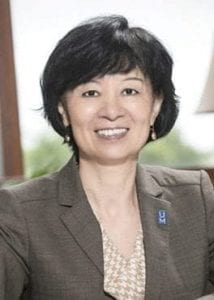Dear colleagues and friends,
The COVID-19 Pandemic has brought unprecedented challenges to all of us, from local to global. The COVID Pandemic clearly illustrates the intersection of systemic racism, social risk factors, insufficiencies of pandemic responses, and health inequities. To date, millions of people have been infected and hundreds and thousands of lives have been lost in the United States. A gulf of health inequities exits among vulnerable populations and people in communities of color as evidenced by higher rates of COVID related morbidity and mortality.
We have learned and continue learning what to prepare and how to respond to public health emergencies like the COVID-19 Pandemic. Nurses on the frontlines are working under extraordinarily stressful circumstances, and in some cases without the proper personal protective equipment (PPE) and other resources needed to keep themselves, their patients, and their own families safe. Nurses reported an urgent need for education on caring for COVID-19 patients, PPE usage, personal safety, and COVID-19 testing. Public health crisis needs public health infrastructure with accurate and clear national policies and guidelines and health professions with critical knowledge and skills of pandemic preparation and response.
The COVID Pandemic has brought a new reality of volatility and ambiguity. Despite unprecedented challenges, in the Loewenberg College of Nursing, we see the power of our faculty, students, staff, and community partners for being adaptive, active, and agile.
Adaptivity – In the middle of the 2020 spring semester, the severity of the COVID Pandemic forced the University of Memphis to transition to remote teaching and learning. Most of the clinical sites were closed to nursing students. Our faculty quickly adapted to new or different ways of teaching remotely, either through e-courseware or UM Global online platform. The power of adaptivity is evidenced by students’ learning success, staff’s service efficiency, and faculty’s teaching effectiveness!
Activity – In the College, our simulation Director and faculty technology integrators actively design and implement virtual simulation, telehealth, shadow health, and virtual care across programs in support of faculty teaching and student learning. Our staff has timely communicated with more than 1,000 students virtually on both campuses – Memphis and Lambuth, and the leadership team has provided support, ongoing communication, and needed resources. In our community of higher education, we collaborate, connect, and commit to fulfillment of our mission and goals.
Agility – We seized opportunities amid the COVID Pandemic. Many of our students from disadvantaged backgrounds struggled to study while supporting self and families. In 2020, we are awarded two grants from Health Resources and Services Administration (HRSA): a 5-year, $3.24Million funding (PI-Dr. Eric Bailey) to support students from disadvantaged backgrounds and a 2 year, near $1Million funding (PI-Dr. Lin Zhan) to enhance eldercare education across the BSN curriculum, as well as address the lack of diversity in the nursing workforce and the limited basic training for nurses in the care of older adults in rural areas. Between 2019 and 2020, the College received a total of $7 million grant funding, including $2.7 million (PI- Dr. Anita Boykins) HRSA grant and $450,000 (PI-Dr. Genae Strong) funding from Tennessee Department of Health.
In 2020, the Commission of Collegiate Nursing Education (CCNE) notified the College for being fully accredited for its undergraduate and graduate programs (2020-2030). The 2020 US News and World Report has ranked the College’s online Graduate Programs #31, and #13 for Veterans.
We continue advancing one of our strategic goals – diversity, equity, and inclusion, as evidenced by formation of the Diversity and Inclusion Committee and active participation in the University’s initiative “Eradicating Systemic Racism and Promotion Social Justice.” Systemic Racism is public health crisis. We all have a responsibility to make a concerted effort, an intentional commitment to critically examine systemic inequities, structural barriers, exclusion, and biases in how nurses are educated or prepared. Diversity, equity, and inclusion as a value in nursing are essential for nursing education to achieve excellence in learning, teaching, research, service, and practice.
Despite the Pandemic, our compassion is reflected through acts of kindness and caring. We work together as a community to navigate through this crisis. We continue to provide high quality and innovative academic programs, promote student success, advance diversity and inclusion, advance nursing science, and sustain and expand academic practice partnerships.
We are adaptive, active, and agile!
Go UofM Nursing!




